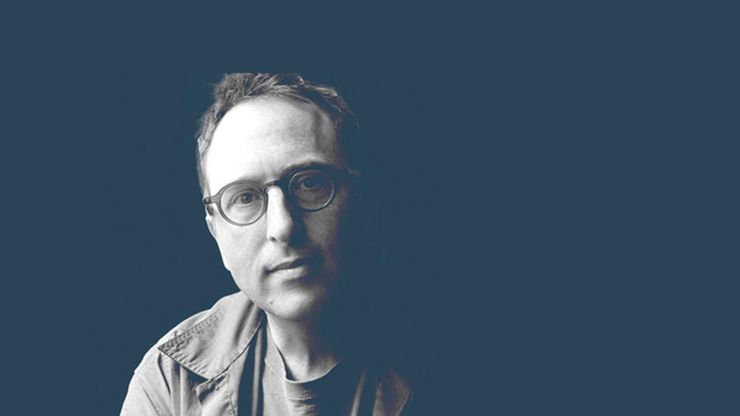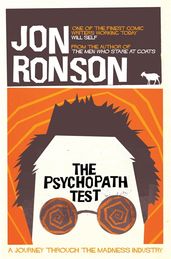Jon Ronson on learning how to spot a psychopath
In his book, The Psychopath Test, Jon Ronson delves into the world of madness. Here he tells us what he learnt on his journey.

The Psychopath Test is an adventure into the world of madness, in which Jon Ronson meets psychopaths, those whose lives have been affected by madness, and the people whose job it is to diagnose it, including the influential psychologist who developed the Psychopath Test. Here, Jon tells us what inspired the book and what he learnt from his investigations.
What made you want to write this book?
I wanted to write a book about madness because it has always been - I think - the elephant in the room of my other books. Do the people I write about behave the strange ways they do because madness is the engine that powers them? I felt I needed to address this question head-on. Is madness the force that makes the world go around?
Tell us about The Psychopath Test
It begins with me meeting a man at Broadmoor hospital - formally Broadmoor Asylum for the Criminally Insane - who wants to convince me that he faked madness to get out of a prison sentence and now he's stuck inside Broadmoor, and nobody will believe he's sane. (It was the Scientologists who led me to Tony). This takes me into the world of people who decide who is and isn't sane - who is and isn't a psychopath, more specifically.
These powerful psychologists teach me the art of psychopath spotting. They say you can tell them by their sentence construction, their nonverbal clues, etc. They turn me a bit power-crazed with my new psychopath spotting powers, and I go out into the world to try and spot psychopaths in high places - at the helm of corporations, etc.
Eventually I realize I've gone power-mad, and the book becomes a look at how people are judged, more and more, by their maddest edges. So it becomes a bit of a paean to eccentricity - that it's okay to be a bit eccentric. You shouldn't be reduced to labels. You shouldn't become victim to the kind of power-crazed psychologist and journalist I became while writing the book.
What would you like readers to take away from the book?
This is – like my previous books – a funny, exciting adventure story, a journey. But it is about some very serious things. Without in any way disrespecting those people who have debilitating mental health issues (God knows there are enough of them in my life) the book shines quite a shocking light on how people in the middle – people who just aren’t conformist enough for our increasingly conformist world – are falling foul to mental health checklists, getting judged by their madder edges, sometimes with disastrous results.
There are tragedies chronicled in my book. Tony, the man who faked madness, has lost 14 years of his life to Broadmoor because as a kind of semi-psychopath he got judged by his maddest edges.
I tell the story of a young girl, Rebecca Riley, killed by an overdose of anti-bipolar medication when she was much too young to have been diagnosed with the disorder. She was a bit of a pain, but in a world in thrall to mental health checklists her tantrums were labeled bipolar disorder.
I look at how TV does it too – I meet researchers (on shows like Jerry Springer) who admit they’re covertly looking for the “right sort of madness” in prospective interviewees to make for entertaining TV. This is a world where madness can be lucrative if exploited properly.
So the book becomes quite critical of the world of psychology and especially criminal psychology. Some of those at its helm are just as crazy – in their ways – as those they’re labeling.
Did anything surprise you, during the course of writing The Psychopath Test?
Something I found especially shocking was the realization that learning how to be a psychopath-spotter really did turn me quite power-mad. It took precisely three days in West Wales on a psychopath spotting course to turn me from a liberal into someone thrilled to reduce humans to the level of monsters. It was like the Milgram experiment. I used to think I’d never press the button and electrocute the guy, but this book proves that I was fully capable of it. And maybe we all are. Or maybe just me.
Saying that, there��’s no question that psychopath spotters – including their widely-respected leader, the psychologist Robert Hare, are onto something. When I visit Emmanuel Toto Constant, the former Haitian death squad leader, in prison in upstate New York, he slides into the psychopath checklist categories with ease and aplomb.
Which writers have had the greatest influence on you?
Kurt Vonnegut, Raymond Carver, Jonathan Coe, Lynn Barber, Gitta Sereny, Paul Auster, PJ O Rourke and Hunter S Thompson.
What advice would you give to aspiring writers?
Find a subject that fascinates you and write well about it.
Why did you become a writer?
It was the only thing I was good at. Now it is a compulsion. If I don’t write I go nuts.
The Psychopath Test

What if society wasn't fundamentally rational, but was motivated by insanity? This is the question that began Jon Ronson's investigations into the world of madness. This entertaining and honest book asks serious questions about how our world defines normality.